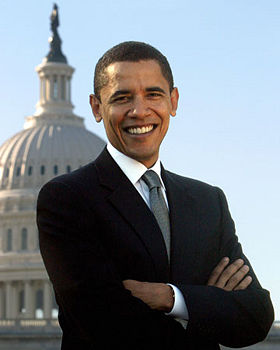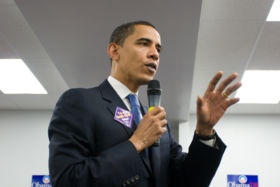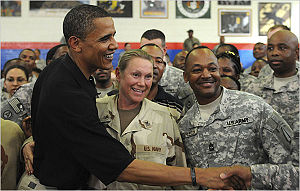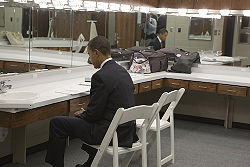Barack Obama
Barack Obama [bə'ɹɑ:k oʊ'bɑ:mə] (born Barack Hussein Obama, Jr., on August 4, 1961, in Honolulu, Hawaii) is the President-elect of the United States of America. He will be the nation's 44th president, succeeding current President George W. Bush, and is the first African American to be elected to the presidency.[1]
He became the nominee for the Democratic Party in the 2008 presidential election, defeating Senator Hillary Clinton in the longest primary season in American history. [2] His vice-presidential running mate is Joe Biden. For details of his role in the recent presidential campaign, see the section "Presidential campaign", below.
Prior to being President-elect, Obama was elected to the U.S. Senate in 2004 after serving 8 years in the Illinois state senate.
See 2008 United States presidential election for latest updates.
Early life
Obama was born in Honolulu, Hawaii. His parents were Barack Obama, Sr. (a Kenyan citizen born Muslim, later atheist) and Ann Dunham, an American student from Kansas. His father deserted the family when Obama was 2 years old and later divorced his mother. His father returned to Kenya and met Barack Jr. only once thereafter; he died in a car accident in 1982. In 1967, his mother married Lolo Soetoro, a Muslim Indonesian student, with whom she had one daughter, Maya. The family lived for several years in Indonesia. Obama's mother died in 1995 of ovarian cancer. Obama's experiences growing up as a multiracial American, as well as the absence of his father, were described in his best-selling 1995 memoir Dreams of My Father: A Story of Race and Inheritance. From his father's side, Obama has two half-sisters and five surviving half-brothers.[3]
He returned from Indonesia in 1971 to live with his maternal grandparents in Hawaii, where he attended the elite private Punahou School, graduating in 1979. [4] Obama states that he used alcohol, marijuana, and cocaine during his teenage years, to "push questions of who I was out of my mind." [5] In his book, Dreams of my Father, Obama reports that, "For my grandparents, my admission into Punahou Academy heralded the start of something grand, an elevation in the family status that they took great pains to let everyone know." His grandmother, Madelyn Dunham, died the day before the 2008 U.S. presidential election; Obama had earlier cut short some of his campaign schedule to visit her, and later received condolences from his Republican rival, John McCain.[6]
Early career
Obama attended Occidental College in Los Angeles, 1979-81, then transferred to Columbia University in New York City and was awarded a BA in political science in 1983. He worked as a community organizer in Chicago (1985-8). He earned a J.D. Magna Cum Laude from Harvard Law School in 1991, where he was the editor of the prestigious Harvard Law Review. After moving to Chicago, his wife's hometown, in 1991 he managed a voter education registration drive for the city Democrats. In 1993 he joined the law firm Miner, Barhill and Galland P.C as an associate and became a Senior Lecturer in Law at the University of Chicago Law School, where he taught a course on constitutional law. His firm was connected to Democratic politics and focused on civil rights litigation and community redevelopment. As an associate he litigated voting rights and employment cases and also argued appeals in the US Court of Appeals. After three years as an associate in 1996 he was appointed "Of Counsel" with Miner, Barhill and Galland, an appointment he still holds; he was never a partner.[7] In the 1980s he joined the United Church of Christ (UCC) denomination (formerly the Congregationalists) and now attends Trinity United Church of Christ in Chicago.[8]
He married Michelle Obama (1964–) in 1992; they have two daughters, Malia Ann (born 1999) and Natasha (Sasha) (born 2001). Michelle Obama grew up in a working-class African-American family on Chicago's South Side, then graduated from Princeton College (B.A. 1985) and Harvard Law School (JD, 1988). She was an associate at a leading Chicago law form, Sidley and Austin, specializing in intellectual property. She became an aide to mayor Richard J. Daley, and then as the city of Chicago's assistant commissioner of planning and development. Since 2005 she has been vice president of community and external affairs at the University of Chicago Medical Center, where she is responsible for all programs that involve the relationship between the Hospitals and the community; she also supervises the Hospitals' business diversity program. In her senior thesis at Princeton in 1985, Mrs. Obama wrote that her college experience "made me far more aware of my 'blackness' " than ever before, adding, "I will always be black first and a student second" on campus. At Harvard Law, Mrs. Obama, involved in the Black Law Students Association, pushed hard to improve the low numbers of African-American faculty and students. She has been a vigorous campaigner in 2008.[9]
Illinois state legislature
Obama was elected unopposed to the Illinois State Senate in 1996 representing the 13th District, comprising the university neighborhood of Hyde Park in south Chicago. Obama now claims his major accomplishments included, "creating programs like the state Earned Income Tax Credit", "an expansion of early childhood education"; and "legislation requiring the videotaping of interrogations and confessions in all capital cases."[10] However at the time Obama had a reputation as an ineffectual legislator. Some colleagues saw him as a self-righteous goo-goo who thought he was too cool for the chamber and who disdained the hard work of digging up votes. "Barack is a very intelligent man," newsman Rich Miller said in 2000. "He hasn't had a lot of success here [in the state senate], and it could be because he places himself above everybody. He likes people to know he went to Harvard."[11] In 2002 he spoke out in opposition to an invasion of Iraq, and in his presidential campaign has repreatedly emphasized that opposition, noting that Hillary Clinton voted in support of President George W. Bush.
In 2000, he made an unsuccessful Democratic primary run for the U.S. House of Representatives seat held by four-term incumbent candidate Bobby Rush. Rush was endorsed by President Bill Clinton and portrayed Obama as an elitist Ivy Leaguer who was "not black enough." Obama responded, "When Congressman Rush and his allies attack me for going to Harvard and teaching at the University of Chicago, they're sending a signal to black kids that if you're well-educated, somehow you're not 'keeping it real.'" Rush won easily 61%-30%, and Obama changed his campaign style.[12]
During his 2004 U.S. Senate campaign, the Illinois Fraternal Order of Police initially endorsed Daniel Hynes but, after Hynes lost in the primary, later endorsed Hynes opponent, Obama. Given his support of police restrictions in interrogating suspects and requiring police to collect racial information, his police support was mixed as evidenced by a chilly reception he received at a speech to police. [13]
Keynote address at 2004 Democratic National Convention
Obama received national attention when he delivered the keynote address at the 2004 Democratic National Convention while still serving as a state senator and running for US Senate. The speech was hailed for its powerful oratory, and its call to unify both sides of the political spectrum in America.[14]
United States Senator
In 2003, Obama began his run for the U.S. Senate open seat vacated by Republican Peter Fitzgerald. The front-runner for the nomination, stock trader Blair Hull, spent $29 million on the primary but gained only 11% of the vote. State Comptroller Dan Hynes had the support of the Cook County organization but gained only 24% of the vote. Obama, riding a wave of antiwar sentiment easily won the primary with 53%. The Republican Party primary winner Jack Ryan was forced out of the race following public disclosure of divorce records containing steamy sexual allegations by Ryan's ex-wife. With less than three months to go before election day, Republicans picked Alan Keyes, an African American diplomat under Ronald Reagan and a conservative activist from Maryland, to replace Ryan on the GOP ticket. Keyes moved to Illinois for the campaign and was ridiculed for carpetbagging and for his rigidly conservative positions, which many found out of the mainstream. At one point, Obama's lead in the polls was so secure, that he allowed staffers to work on other Democratic campaigns. After spending $14 million (against $2.5 million by Keyes), Obama won 70%-27%.[15]
Senate career
Obama was sworn in as a Senator on January 4, 2005. Three months into his Senate career, and again in 2007, Time magazine named Obama one of the world's most influential people.[16]
As Senator, Obama co-sponsored the "Secure America and Orderly Immigration Act" introduced by Republican Senator John McCain. [17]
During the first month of the 110th Congress, Obama introduced the Iraq War De-Escalation Act, a bill that caps troop levels in Iraq at January 10, 2007 levels, begins phased redeployment on May 1, 2007, and removes all combat brigades from Iraq by March 31 2008.[18] This bill was not voted on. Obama has long stressed his anti-war position. [19]
Rezko controversy
In November 2007, Obama was subject to controversy over his home purchase with indicted Illinois businessman, Antoin Rezko. A homeowner sold Obama a house at a discount and simultaneously an adjacent vacant lot at the full asking price to Rezko's wife. Obama said the arrangement was "boneheaded" but not illegal. [20] Obama has not been charged with any crime.
Presidential campaign
In February 2007, Obama announced at the Old State Capitol building in Springfield, Illinois, that he was a candidate for U.S. President. [21] For daily updates on the polls see [8]
This section duplicates the Obama section of 2008 United States presidential election
Obama presented himself as a post-racial, post-partisan contender of universal appeal, promising to end the old politics and bring the country together in bipartisan fashion. He appealed strongly to youth and stresses his early opposition to the war in Iraq. Making "change" his central campaign theme and downplaying race, Obama, a charismatic speaker, argues "We can't afford to settle for the same old politics." In late 2007 he repeatedly attacked Clinton for her 2002 vote supporting war against Iraq, and for her ties to lobbies and old-fashioned politics.[22] Clinton responded by hammering away at Obama's inexperience and charged he substituted rhetoric for action. Bill Clinton, noting that Obama and his wife recorded similar voting records in the Senate, snapped that Obama was engaging in a "fairy tale" regarding Iraq, a point of ridicule that bothered Black leaders and increased racial polarization among Democrats.[23]
Obama raised $103 million in 2007 and spent $85 million, and raised a record setting $32 million in January 2008. In terms of his Senate voting, he moved 15 places to the left in 2007, ranking as the most-liberal member of the U.S. Senate. In 2006, he had been the 16th-most-liberal senator.[24] Obama's popularity is strongest among younger and better educated voters. He dominated African American support, which comprises about 20% of the Democratic primary vote nationwide, and 30-50% in the deep South, notably as South Carolina, Mississippi, Alabama and Georgia. However Clinton's husband Bill Clinton has long been popular in the black community and she received many high profile endorsements.
2008 began with Clinton enjoying a big lead nationally, but Obama scored a stunning victory on January 3, in the Iowa caucuses, defeating Clinton and John Edwards by 8 points. [25] With Obama seizing the momentum and attracting youthful voters, pundits and pollsters agreed he was heading to a landslide win in the New Hampshire, the first primary state. But Clinton surprised everyone (even her own staff) by winning the primary 39% to 37% for Obama and 17% for Edwards. Obama did best among men, younger voters, independents, and college graduates, while Clinton won by wide margins among women, poorer voters, union members, registered Democrats and older voters--that is, her voter profile resembled the historic New Deal Coalition.[26] Clinton again outpolled Obama in the Nevada caucuses, but Obama refused to concede because he claimed one more delegate than she. With John Edwards trailing far behind, the Democratic contest focused on Obama and Clinton. In a bruising battle in South Carolina on Jan. 26, Obama, with strong black support, won decisively. Clinton remains ahead in nationwide polls and in most states on Tsunami Tuesday. The campaign turned rough in mid-January, as Obama began to link the two Clintons:
- "He [Bill Clinton] continues to make statements that are not supported by the facts — whether it's about my record of opposition to the war in Iraq or our approach to organizing in Las Vegas. This has become a habit, and one of the things that we're gonna have to do is to directly confront Bill Clinton when he's making statements that are not factually accurate."[27]
Obama won a landslide in the South Carolina primary by sweeping 78% of the the blacks vote and 25% of the whites, giving him 55% overall to 27% for Clinton and 18% for Edwards. Analysts point out that the upshot may be that Obama is typecast as the "black candidate" with a weak appeal to Hispanics as the contest heads to states where blacks comprise less than 25% of the primary voters. As political scientist Larry Sabato noted, "A few carefully chosen words and framing angles [by the Clintons] have transformed Obama from the post-racial, post-partisan contender of universal appeal into a more typical African-American candidate, who is much less intrinsically attractive to whites and Hispanics." On Tsunami Tuesday the outcome was a virtual tie in terms of votes and delegates. [28]
After Tsunami Tuesday, Obama won 11 straight contests, carrying major states like Virginia, Maryland and Wisconsin by landslides, and reducing Clinton's once formidable coalition to a narrow lead among white women and Latinos. She rebuilt her coalition in Texas, Ohio and Pennsylvania, equalizing the race in early March. Meanwhile Obama was embarrassed when a top foreign policy advisor resigned after calling Clinton a monster, when attention focused on an Obama business partner and fundraiser on trial in Chicago on criminal charges, and the diplomatic episode in which Obama's top economic advisor told Canadian officials that Obama's attacks on the NAFTA trade agreement represented campaign rhetoric.
Even sharper attacks were directed at the Rev. Jeremiah A. Wright Jr. of Chicago, who was Obama's minister and spiritual advisor for 20 years. Obama opponents circulated videos of Wright's hardline attacks, including the statement "God damn America for treating our citizens as less than human," in reference to U.S. race relations. Obama in mid-March disavowed Wright, but his long-time association with Wright proved a major campaign issue for Clinton. Polls in March showed him significantly damaged by the Wright connection, losing support among the independents who formed a critical part of his base. Republican strategists predicted that Wright's angry sermons, in which the minister blame American foreign policy for the 9-11 Attack and criticized Israel, could represent a powerful weapon against Obama in the fall. In a major speech on March 18 Obama repudiated Wright but attributed his anger to lingering racism in America; Obama conceded that he knew Wright "to be an occasionally fierce critic of American domestic and foreign policy" and that he had heard controversial remarks in church. Wright himself went on national television to repeat his rhetoric and criticize Obama, forcing Obama to decisively repudiate Wright. In late May another preacher at the same church ridiculed Clinton to a cheering congregation, and Obama officially resigned from the church. About half of North Carolina Democrats said the Wright issue mattered to them, and they voted decisively for Senator Clinton. After the Wright affair McCain pulled slightly ahead of Obama among unaffiliated voters. McCain enjoyed unified support from Republican voters while Obama only attracted 65% of Democratic votes at that time.[29] At a deeper level, Obama had trouble reaching white working class Democrats, who voted heavily against him in April and May primaries, and who told pollsters they may vote for McCain in the fall or just stay home.
Global financial crisis
During the 2008 financial crisis, Obama and McCain clashed over the proposed taxpayer-baked Wall Street bailout; while McCain said he would suspend his campaign to go to Washington for talks over the deal, Obama argued that the forthcoming presidential debate should continue. In the event, Obama did go to Washington, but according to some commentators, was the more effective of the two men in raising pertinent issues. Obama later said that reflection rather than drama was his position during the crisis.[30]
Later campaign and upshot
After John McCain chose little-known Alaskan politician, Governor Sarah Palin, as running mate before the Republican convention in September 2008, the media immediately began scrutiny on her and unearthed a numbers of scandals, including the abuse of power when governing Alaska, as long as gossips such as her daughter's pregnancy. Many pundits noted that though McCain might have chosen Palin to attract the Republican base, she ultimately hurt his campaign by alienating moderate voters. Obama's campaign in deed capitalized on the shortcomings of Palin, and attacked her social conservative views as too extreme. He also criticized the hateful slogans shouted out during a rally conducted in support of Palin.
Meanwhile, the McCain campaign zeroed in at the possible connection between Obama and a notorious 1960s terrorist, Bill Ayers, who went on to a teaching career in Chicago and had association with Obama. In November 4th, the election day, Obama won a resounding victory and gained the presidency, with majority in both popular and electoral votes, picking up traditionally Republican-dominated states such as Indiana, North Carolina, and Virginia, as well as winning most swing states such as Florida and Ohio.
Family life
He married lawyer Michelle LaVaughn Robinson on October 18, 1992. They have two daughters, Malia (born 1999) and Natasha or "Sasha" (born 2001).
References
- ↑ In 1988 Jesse Jackson won 13 primaries and caucuses; unlike Obama, Jackson never led in the polls or delegate counts. Larry M. Bartels, C. Anthony Broh, "A Review: The 1988 Presidential Primaries," The Public Opinion Quarterly, Vol. 53, No. 4 (Winter, 1989), pp. 563-589
- ↑ See [1] for recent newspaper and magazine articles
- ↑ see [2]
- ↑ See [3] and [4]
- ↑ Effect of Obama's Candor Remains to Be Seen, [5]
- ↑ BBC News: 'Barack Obama's grandmother dies '. November 4th 2008.
- ↑ Abdon M. Pallasch, "Obama's Legal Career," Chicago Sun Times, Dec. 17, 2007
- ↑ See J. Bennett Guess, "Thomas denounces smear campaign against UCC’s largest congregation", Jan. 11, 2008, a United Church of Christ press release
- ↑ Monica Langley,"Michelle Obama Solidifies Her Role in the Election", Wall Street Journal Feb. 11, 2008]
- ↑ See official Senate webpage
- ↑ Edward McClelland, "How Obama Learned to Be a Natural" Salon Feb. 12, 2007
- ↑ Edward McClelland, "How Obama Learned to Be a Natural" Salon Feb. 12, 2007
- ↑ Chicago Tribune, Cops Give Obama Subdued Reception
- ↑ USA Today, Illinois' Obama revisits idea of 2008 run for White House
- ↑ Michael Barone and Richard E. Cohen, Almanac of American Politics: 2008 (2007) 538-43.
- ↑ http://www.time.com/time/subscriber/2005/time100/leaders/100obama.html
- ↑ U.S. Senate, 109th Congress, 1st Session. S. 1033, Secure America and Orderly Immigration Act, Thomas, May 12, 2005. Retrieved on 2007-07-22.
- ↑ http://nwitimes.com/articles/2007/02/07/news/illiana/doc65cc98d8dc6506b28625727b0011edb5.txt
- ↑ Obama stresses anti-war stance, http://www.chicagotribune.com/news/politics/chi-obama_sun_finalmay20,0,6337865.story
- ↑ Obama Says He Regrets Land Deal With Fundraiser, http://www.washingtonpost.com/wp-dyn/content/article/2006/12/16/AR2006121600729.html
- ↑ http://news.bbc.co.uk/2/hi/americas/6349081.stm
- ↑ "Senator Obama's victory speech [in Iowa] was a concise oratorical gem. No candidate in either party can move an audience like he can.... He's...charismatic." Bob Herbert, "The Obama Phenomenon," The New York Times, Jan. 5, 2008; Obama Dec 27. 2007 speech at Obama official website; Jonathan Greenberger, ABC News, May 17, 2007 report
- ↑ Kristin Jensen and Julianna Goldman, "Clinton, Obama Battle Makes for Partisan Politics Without Unity," Bloomberg News, Jan. 10, 2008
- ↑ Brian Friel, Richard E. Cohen and Kirk Victor, "Obama: Most Liberal Senator In 2007" National Journal, Jan. 31, 2008
- ↑ http://www.timesonline.co.uk/tol/news/world/us_and_americas/us_elections/article3134308.ece
- ↑ See NBC report at [6], and CNN report at [7]
- ↑ Carrie Budoff Brown, "Obama faces off against both Clintons," POLITICO Jan 20, 2008
- ↑ Mark Z. Barabak, "Obama easily wins heated S.C. primary," Los Angeles Times Jan. 27, 2008; Larry Sabato, Sabato's Crystal Ball - Vol. VI#3 Jan 24, 2008.
- ↑ Tim Reid, "Polls show Barack Obama damaged by link to Reverend Jeremiah Wright," (London) Times Online Mar. 21, 2008; Rasmussen reports, "The Impact of Pastor Wright and THE SPEECH on Election 2008," March 20, 2008
- ↑ TIME: 'Why Barack Obama is winning.' November 3 2008.



